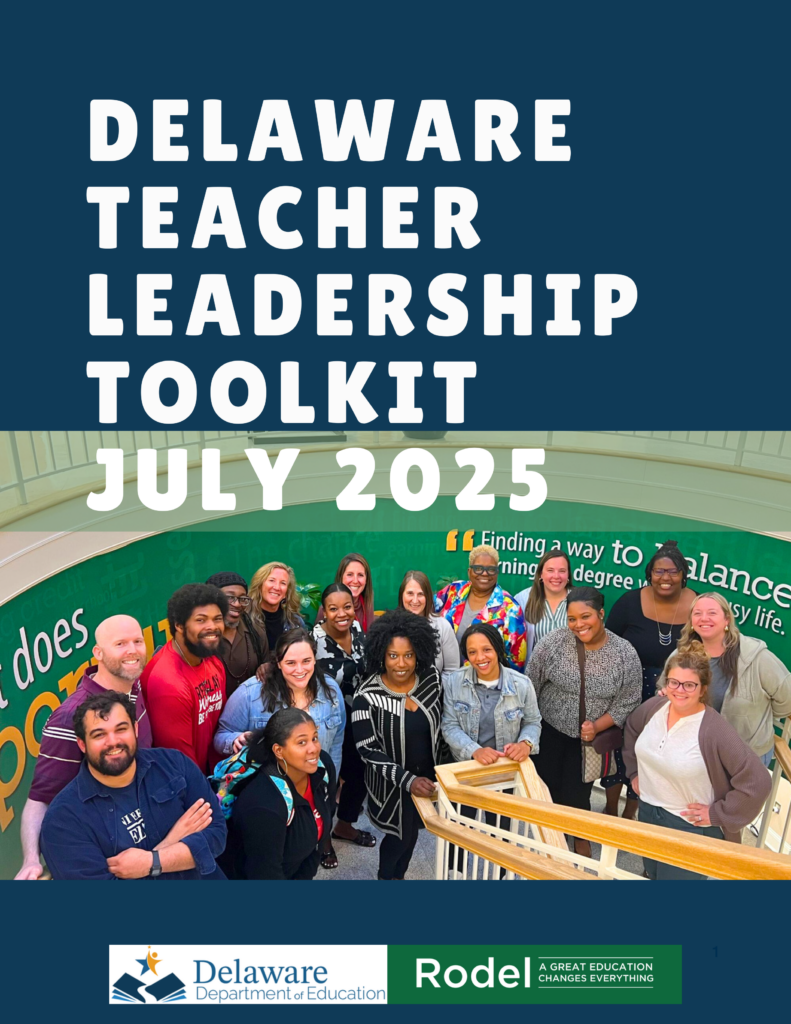“Not Just a Title” — Local Educators Weigh in on Teacher Leadership

As we’ve written before, educators do much more than simply “teach.” Often, they’re asked to take on more roles in their schools on top of their teaching responsibilities, and many times, without additional compensation.
We also know this is particularly true for teachers of color, who are relied upon to take on additional responsibilities, serve on committees, or serve as default leaders without additional pay or recognition.
Leadership is also a key factor in retention. As noted in the latest edition of Rodel’s “Delaware Public Education At A Glance,” school leadership was cited as the top reason educators left their jobs between 2019 and 2024, followed closely by district leadership and/or policies. Educators of color were more likely to leave their roles due to teacher leadership and decision-making involvement when compared to white teachers
With support from the Delaware Department of Education (DDOE), Rodel has engaged with educators from across the state to dig deeper into the issue of school leadership. In 2023, a cohort of teachers developed a toolkit of resources to drive future state investments and policies to support teacher leadership statewide. And this past year, a new cohort collaborated to create a profile and a definition of teacher leadership, a glossary to really help ground us in common language, a self-assessment tool, and also a readiness tool. The Statewide Teacher Leadership Innovation Committee brings together a diverse group of educators from across the state to design a bold, equity-centered vision for teacher leadership in Delaware.
From October 2023 through June 2025, 18 teachers representing 11 Local Education Agencies (LEAs) across all three counties participated in the committee. Their charge was to co-create an innovative, culturally responsive model for teacher leadership that centered both teachers and students. This work built on earlier efforts that highlighted the need for more inclusive definitions of school leadership and positioned cultural proficiency as essential to advancing equity in schools. Committee members developed a statewide toolkit for teacher leadership that includes:
- A shared definition of teacher leadership grounded in cultural proficiency and equity
- A detailed teacher leader profile that outlines key mindsets, skills, and competencies
- A glossary of common terms to promote shared understanding and language
- A self-assessment rubric to help identify and develop culturally proficient teacher leaders
- A readiness assessment to help school systems create the conditions needed to foster and sustain effective teacher leadership
The committee’s work is grounded in data from Delaware-based teacher leadership pilots, national and local frameworks, and educator perspectives collected through interviews and focus groups. Together, the committee reimagined the role of teacher leadership in strengthening retention, improving student outcomes, and cultivating more inclusive school environments.
Here are just a few reflections from these exemplary educators:
On the project overall…
“Being part of this committee made me realize anyone can be a teacher leader—you just have to find your own way of doing it.” Clark Scott, Red Clay Consolidated School District
“I thought I had to leave the classroom to lead. Now I know I can do both—and that’s powerful.” Anthony Natoli, Cape Henlopen School District
“It’s opened my eyes to the entire school ecosystem—how every role, from cafeteria staff to security, is part of the leadership picture.” Matthew Lewis, Sussex Tech High School
On the tools and resources they created…
“It was like an aha moment when we finished the profile—this powerful thing that defines what teacher leadership really looks like.” Yvonne Thomas, Brandywine School District
“When you can name it and observe it, then you can coach it. That’s what our toolkit finally allows people to do.” Stephanie Callaway, Colonial School District
“I’m most proud of our self-assessment tool—it helps teachers start that internal conversation about who they are and who they want to be.” Melodie Miller-Goodman, Delaware Department of Education
On how this project impacted their careers, mindsets, and professional growth…
“Leadership used to feel like something for the end of your career. This work showed me I can be a leader now, in my own way.” Clark Scott, Red Clay Consolidated School District
“I used to think being a leader meant stepping out of the classroom. Now I know leadership can—and should—happen within it.” Christina Horstmann, Colonial School District
“This project helped me understand leadership isn’t a title—it’s how I show up daily. That shift changed everything for me.” Brandi Henderson, Smyrna School District
On the key lessons learned…
“What I found is leadership is more of a daily routine—an action, not a title. That was a powerful lesson.” Brandi Henderson, Smyrna School District
“Teachers who are closest to the challenge should define what leadership looks like. That idea grounded all of our work.” Stephanie Callaway, Colonial School District
“It’s about being, not just doing. Being around this group reminded me that real leadership is intentional, reflective, and shared.” Khayree Bey, Red Clay Consolidated School District
The committee is excited to begin piloting these tools in schools across Delaware. Early implementation will offer valuable insights that will inform refinements and ensure the resources are responsive to the needs of educators and students. The committee extends its gratitude to DDOE for its ongoing partnership and support in advancing this work. Together, they are shaping a bold, equity-centered vision for teacher leadership that will empower educators and strengthen school communities statewide.
Related Topics: affinity groups, burnout, Delaware education, delaware schools, middle grades, professional development, Red Clay School District, School Leadership, Teacher Effectiveness, Teacher Evaluation, teacher pathways, teacher prep, Teacher Preparation, teacher voice, voices from the classroom